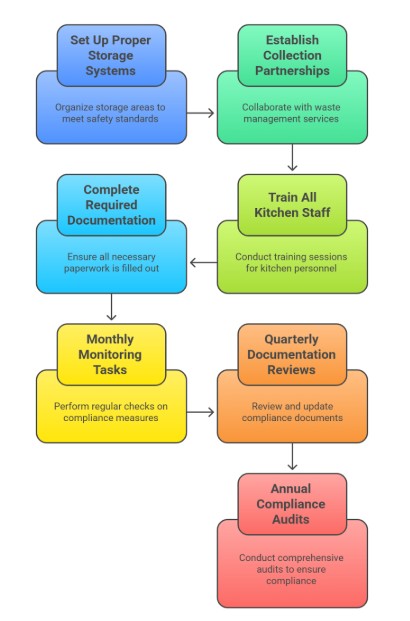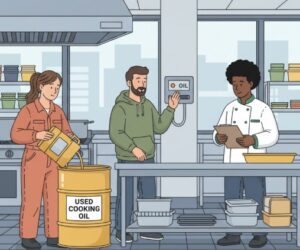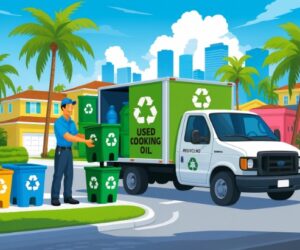
Florida Used Oil Disposal Regulations: Essential Compliance Guide for Restaurant Owners in 2025

Florida restaurants must follow strict rules when disposing of used cooking oil. Mess up, and you could face hefty fines—or even cause environmental harm.
Restaurants must collaborate with licensed oil recycling companies to ensure compliance with Florida’s disposal laws and local codes.
In 2025, the rules got more complicated, so owners really need to stay on top of both state and local ordinances.
Improper disposal of used cooking oil isn’t only a bad practice, but also illegal. Pouring oil down drains leads to plumbing disasters and environmental headaches.
State and local agencies set up specific rules to protect water systems and public health. Restaurant managers who understand these rules can avoid violations and contribute to a healthier environment.
The main thing? Know which rules apply where you operate, and pick the right disposal partners. Otherwise, you’re risking more than just a slap on the wrist.
Key Takeaways
- Florida restaurants must use licensed oil recycling companies and can’t pour used cooking oil down drains or throw it in the regular trash.
- Local areas, such as Miami-Dade, layer on additional grease discharge permits and regulations.
- Managers should check hauler licenses, keep disposal records, and follow a compliance checklist to avoid fines.
Why Florida Regulates Used Oil — The Legal & Environmental Rationale

The Environmental Protection Agency (EPA) oversees the management of used oil under federal law.
The Resource Conservation and Recovery Act establishes national standards for the collection, transportation, and disposal of hazardous waste.
Florida takes this seriously. The Florida Department of Environmental Protection enforces EPA rules at the state level.
Environmental protection is at the heart of these rules. Used oil contains harmful substances that can contaminate drinking water and soil. One gallon of used oil can ruin a million gallons of fresh water—let that sink in.
The Department of Environmental Protection updated its rules in 2019. Revised used oil management rules went into effect on November 13, 2019, to clarify business requirements.
Florida’s regulations cover a lot:
- Storage requirements for used oil containers
- Spill prevention and cleanup steps
- Record-keeping duties
- Proper disposal methods
If restaurants mishandle used oil, they face legal trouble. Federal and state regulations outline the procedures for handling used oil to ensure safety and compliance.
The Florida Department of Environmental Protection gives out guidance to help businesses understand their responsibilities. FDEP offers fact sheets and compliance help for waste management.
The Core Rules Restaurants Must Know in 2025
Florida restaurants must follow clear rules for disposing of used cooking oil. The regulations outline where oil cannot be stored, how to store it, who is authorized to pick it up, and when permits are required.
Prohibited Disposal Methods
Restaurants can’t pour used cooking oil down drains, toilets, or storm sewers. That clogs pipes and messes up water treatment.
Dumping oil on the ground or in dumpsters is illegal, too. Oil seeps into soil and groundwater, causing real problems.
Banned disposal methods include:
- Pouring oil down any drain
- Dumping in regular trash containers
- Throwing oil on parking lots or outside
- Mixing with other waste
- Burning oil without permits
Break these rules and you’ll face fines and cleanup bills. Florida’s used oil management rules ban these disposal options.
The state takes improper oil disposal very seriously. Get caught and you could be looking at thousands in penalties.
Proper Storage Of Used Oil
Store used cooking oil in leak-proof containers until it is picked up. Metal or plastic tanks work best.
Keep storage areas covered to prevent rainwater from entering. Water contamination makes recycling a challenge and adds to the cost.
Storage requirements:
- Use containers made for oil storage
- Keep storage areas tidy
- Keep water out of containers
- Label containers clearly as “used cooking oil.”
- Check for leaks regularly
Put containers away from storm drains. If spills occur, clean them up promptly to prevent environmental harm.
Indoor storage keeps oil in better shape than outdoor storage. Still, outdoor work is possible if containers are covered and secure.
Hauler Requirements And Documentation
Restaurants must work with licensed oil recycling companies to comply with Florida’s regulations. Only licensed haulers are permitted to collect used cooking oil from commercial kitchens legally.
Licensed haulers supply proper storage gear and regular pickups. They also handle all the paperwork.
Documentation requirements:
- Keep records of all oil pickups
- Save hauler license info
- Track how much oil you dispose of
- Keep pickup receipts for three years
Always check your hauler’s Florida license. Unlicensed collectors can’t legally move used cooking oil.
The hauler should provide you with receipts that include pickup dates and oil volumes. These records prove that you disposed of oil properly, in case regulators come knocking.
Registration And Compliance For Large Volumes
Restaurants that generate a large amount of used oil may require special permits. Florida requires registration for places that store more than certain amounts.
Small restaurants usually don’t need permits if they use licensed haulers. Big chains or high-volume spots may face extra requirements.
Large volume considerations:
- Storing over 1,320 gallons means you need permits
- Multiple locations might need combined reporting
- Regular inspections could be required
- Extra record-keeping rules kick in
Check with the Florida Department of Environmental Protection for permit information. The rules depend on how much you store and the size of your business.
Most restaurants fall under the Small Generator rules. These businesses can use licensed haulers without extra permits or paperwork headaches.
Stay compliant with Grease Pros Recycling’s oil pickup service. Miami restaurants rely on us for safe, legal disposal and recycling—contact us today to schedule service.
If you’re ready to get started, call us now!
Miami-Dade & Local FOG (Grease Discharge Operating Permit) — What’s Different Locally
Miami-Dade County has stricter grease discharge controls than most counties in Florida.
All food service businesses require a Grease Discharge Operating permit from DERM, and they must utilize automated monitoring systems for daily compliance tracking.
GDO Permit Requirements And Record-Keeping
Any commercial spot that handles, prepares, or processes food needs a FOG Discharge Control operating permit. That covers restaurants, cafeterias, bakeries, coffee shops, and juice bars.
Businesses must obtain their city occupational license first, then apply for the FOG permit. The process involves working with the Department of Regulatory and Economic Resources.
The permit system brings strict record-keeping rules:
- Digital reporting: All pump-out data gets uploaded to the county portal
- Automatic penalties: Miss an upload and you get a $250 late fee, no questions asked
- Daily monitoring: The county checks permits and logs every night
Impacts On Restaurants: Cleaning Frequency, Hauler Use, Documentation
Miami-Dade’s consent decree puts food businesses under a microscope. Every grease trap cleaning must be logged through the official portal; failure to do so risks fines or even shutdown.
Cleaning Requirements:
- All grease traps must work properly
- Cleaning frequency depends on trap size and how much you use it
- Chemical additives are totally banned
Documentation Standards:
- Pump-out logs must be submitted digitally right away
- Hauler certificates have to be current and verified
- FOG violations mean monetary penalties
The county uses this data to show they’re following federal sewer overflow prevention requirements.
Step-By-Step Compliance Checklist For Restaurant Managers
Restaurant Compliance Checklist

Restaurant managers require clear action steps to comply with Florida’s used oil disposal requirements. These break down into immediate compliance tasks and ongoing maintenance responsibilities.
Immediate Actions For Compliance
Set Up Proper Storage Systems
Managers need to install used oil storage containers within 30 days. These containers should have secondary containment to prevent spills from escaping.
The storage area needs clear “Used Oil” signs. Keep containers covered and store them in a weatherproof location.
Establish Collection Partnerships
Call licensed used oil recyclers and arrange regular pickups. Obtain written agreements that outline pickup schedules and emergency contacts.
Look up nearby public oil collection centers as backup. Some managers rely on these centers if their regular pickups get delayed.
Train All Kitchen Staff
Run mandatory training sessions on oil handling basics. Cover how to keep water out of the oil and transfer it safely.
Have staff sign off on training forms. Post simple visual guides near fryers to remind everyone about proper disposal steps.
Complete Required Documentation
Fill out the generator ID numbers if your restaurant produces more than 25 gallons a month. Submit permits to the local environmental agency.
Track oil quantities and disposal dates in logs. Establish a filing system to organize all your compliance paperwork.
Ongoing Actions And Record Maintenance
Monthly Monitoring Tasks
Check storage containers for leaks or damage during the first week of each month. Make sure secondary containment still works.
Measure the amount of used oil you have and record it. Compare your monthly totals to your permit limits.
Quarterly Documentation Reviews
Go over all disposal records every three months. Verify that pickup schedules align with the actual events.
Update emergency contacts for your recycling partners. Make sure your staff training records are up to date.
Annual Compliance Audits
Schedule yearly inspections for storage equipment and containment systems. Replace any damaged containers before they cause issues.
Take a look at your relationships with recycling partners and public collection centers. Are the pickup frequencies still right for your oil output?
Update training materials when regulations change. Conduct refresher training for all personnel who handle used oil.
Protect your permits with Grease Pros Recycling’s GDO-compliant hauler service. We provide manifests, reliable pickups, and full records—schedule your fryer oil collection now.
If you’re ready to get started, call us now!
How To Choose A Compliant Hauler (What To Verify)
Selecting the right used oil hauler helps restaurants avoid legal issues and ensures waste is handled correctly.
Restaurant owners should check credentials and ask the right questions before signing with any hauler.
Verification Of State Or County Permits
Ask for proof of current permits before hiring a hauler. Florida debris hauling permits require annual renewal, and expired permits can put both the hauler and the restaurant in hot water.
Used oil transporters must have a valid state certification. The hauler should show documentation proving they meet Florida’s certification requirements for used oil transporters, including annual training and knowledge of state rules.
Key documents to request:
- Current Florida DEP permit
- Used oil transporter certification
- Commercial driver’s license verification
- Insurance certificates
Managers can check permit numbers directly with the Florida Department of Environmental Protection. It only takes a few minutes and can prevent headaches later.
Key Questions To Ask Your Hauler
Ask your hauler about their disposal methods and how they keep records. They should explain where the oil goes and give proof that it ends up at a proper recycling facility.
Essential questions include:
- Where does the oil go after pickup?
- Which recycling facility handles it?
- How often do you provide pickup service?
- What records do you keep for each pickup?
The hauler must provide you with written pickup schedules and maintain detailed records. Businesses that generate used oil have specific record-keeping requirements that rely on the hauler’s documentation.
Also, ask about emergency response plans. The hauler should have a process in place for spills and notify you promptly if something goes wrong during pickup or transport.
Prohibited Practices And Common Violations (So You Can Avoid Fines)
Florida restaurants can get hit with big penalties for improper oil disposal. Knowing what not to do can save a business from expensive mistakes.
Never dispose of used cooking oil in these ways:
- Pouring oil down drains or sinks
- Dumping oil in dumpsters or trash containers
- Disposing of oil on parking lots or ground surfaces
- Mixing used oil with other waste materials
Don’t store used oil in damaged or leaking containers. Cracked drums or broken tanks are environmental hazards and will be flagged immediately.
Storage violations include:
| Violation Type | Description |
| Improper containers | Using non-approved or damaged storage units |
| Inadequate labeling | Missing required identification tags |
| Poor location | Storing oil in areas prone to spills |
Some restaurants believe they can dispose of small amounts of used oil in the trash. That’s a violation, no matter how little oil it is.
If you don’t maintain solid disposal records, you’ll encounter compliance issues. Restaurants must document every oil pickup and transfer it to a licensed hauler.
Common documentation mistakes:
- Missing pickup dates and volumes
- Incomplete hauler information
- Lost disposal certificates
Some places attempt to recycle used cooking oil for heating purposes. This actually requires special permits and equipment, which most restaurants don’t have.
Don’t give used oil to unlicensed people or companies. All disposal has to go through approved waste management services or recycling facilities.
Training gaps often trip up many restaurants. If staff are unaware of the rules, they may inadvertently create compliance issues.
Where Used Oil Goes — Recycling & Beneficial Use
When restaurants dispose of used oil properly, it doesn’t just disappear. The oil actually undergoes several recycling processes that convert it into valuable products.
Re-refining into New Oil
Recycled used motor oil can be re-refined into new oil using advanced filtering and processing. This makes fresh lubricants that work just as well as those made from crude oil.
Fuel Production
Used oil can be processed into fuel oils for heating or running equipment. Industrial plants often utilize this type of recycled fuel for energy production.
Raw Materials for Industry
The petroleum industry also uses recycled oil as a raw material. That means less need to drill for new crude oil.
Environmental Benefits
Recycling used oil prevents it from contaminating soil and water. Just one gallon of used oil can contaminate up to a million gallons of water if it is improperly disposed of.
What Happens to Cooking Oil
Restaurant cooking oil follows similar recycling paths. It can be converted into biodiesel fuel, animal feed, or even soap and cosmetic ingredients. Grease recycling companies collect the oil and transport it to processing plants.
Florida’s recycling program is one of the most successful in the country because it connects businesses with the right disposal options.
Conclusion
Florida restaurants will face strict requirements for disposing of used oil in 2025. If they fail to comply, they risk incurring hefty fines and facing environmental violations.
Professional oil pickup services make compliance a lot simpler. These companies handle storage and collection, and they automatically take care of the documentation headaches, too.
The Florida Department of Environmental Protection regularly updates its rules. Restaurant owners must closely monitor these changes.
Updated draft rule revisions might shake up current procedures. Regularly discussing recycling with partners helps everyone stay on track.
Proper oil disposal protects the environment—and keeps business running smoothly. It also prevents expensive plumbing disasters and reduces fire hazards in busy kitchens.
Restaurants that set up solid disposal systems early sidestep last-minute compliance panic. The cost of professional help usually pays for itself by avoiding fines and headaches down the road.
Florida’s regulations are unlikely to become any looser. Setting up good habits now prepares restaurants for whatever comes next, and customers notice when a business takes a stand for the environment.
Avoid fines and turn waste into renewable energy with Grease Pros Recycling’s Florida used oil recycling service. Book your pickup today—contact us to schedule your appointment.
Contact Us Today For An Appointment
Frequently Asked Questions
Can Florida restaurants pour used cooking oil down the drain?
No. Florida law prohibits disposing of used oil into sewers, storm drains, or landfills. It must be stored safely and collected by a permitted hauler.
What permits do Miami-Dade restaurants need for used oil disposal?
Most food service establishments in Miami-Dade are required to hold a Grease Discharge Operating (GDO) permit and submit pump-out records from permitted haulers.
Do restaurants need to register with the Florida DEP to handle used oil?
If a restaurant only generates used cooking oil, it is not required to register with DEP. However, if oil is stored in large tanks or transported, DEP registration is applicable.
How should restaurants store used cooking oil?
Used oil must be stored in leak-proof, labeled containers with closed lids. Containers should sit on impermeable surfaces to prevent spills.
What records should Florida restaurants keep for used oil disposal?
Restaurants must keep manifests or receipts from haulers, as well as maintenance logs for grease traps and interceptors, for a minimum of 2 years.
What are the penalties for improper disposal of used oil in Florida?
Improper disposal may lead to fines, permit suspension, and costly cleanup orders from county inspectors or DEP enforcement.
What happens to used cooking oil after pickup?
Most collected oil is recycled into biodiesel or used as industrial feedstock, helping to reduce greenhouse gas emissions and creating renewable energy.





